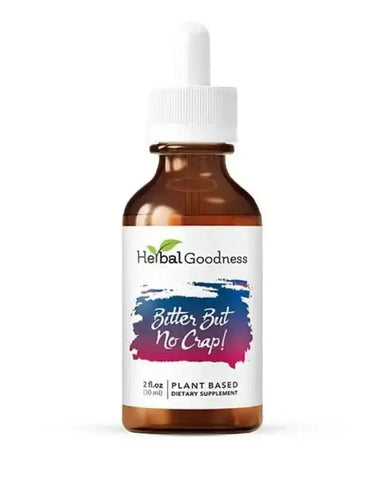Understanding the Digestive System: How to Support Healthy Digestion
The digestive system is one of the body’s most vital networks, responsible for breaking down food, absorbing nutrients, and managing waste. Without healthy digestion, your body struggles to function at its best. Whether you’ve experienced digestive issues like bloating, gas, or indigestion, or you simply want to optimize your digestive health, understanding how this system works is the first step. In this guide, we’ll explore what digestion is, the digestive system function, common challenges, and practical ways to restore balance, including digestive probiotics, enzymes, and herbal bitters.
What is Digestion?
Digestion is the process by which the body breaks down food into smaller molecules that can be absorbed and used for energy, growth, and repair. It starts in the mouth and continues through the stomach and intestines, supported by enzymes, stomach acid, bile, and beneficial gut bacteria.
Digestive System Function: How It Works
The digestive system is a complex series of organs working in harmony. Key stages include:
-
Mouth – Chewing breaks food into smaller pieces, while saliva begins breaking down carbohydrates.
-
Stomach – Produces acid and enzymes to break down proteins and kill harmful bacteria.
-
Small intestine – Nutrient absorption takes place here, supported by digestive enzymes and bile.
-
Large intestine – Absorbs water and minerals, forming solid waste.
-
Gut microbiome – A balance of good bacteria that influence digestion, immunity, and even mood.
Common Digestive Issues
Digestive issues can occur when any part of this process is disrupted. Common concerns include:
-
Bloating and gas
-
Constipation or diarrhea
-
Acid reflux and heartburn
-
Food intolerances
-
Imbalance in gut bacteria
Factors like stress, poor diet, dehydration, and lack of physical activity can all contribute to these problems.
Supporting Digestive Health Naturally
Healthy digestion requires a combination of good habits and nutritional support. Here are some effective strategies:
1. Focus on a Balanced Diet
Avoid processed foods and focus on whole foods rich in fiber, healthy fats, and lean proteins. Limit foods harmful to the digestive system such as excess sugar, fried foods, and alcohol.
2. Try Digestive Probiotics
Probiotics replenish healthy bacteria in your gut, supporting digestion and immunity. Fermented foods like yogurt, kefir, and sauerkraut are natural sources. Supplements can provide an extra boost.
3. Consider Digestive Enzymes Supplements
Enzymes help break down food molecules for easier absorption. Taking the best digestive enzymes supplement may support individuals who struggle with bloating, gas, or difficulty breaking down certain foods.
4. Add Digestive Bitters for Digestion
Bitters are herbs that stimulate digestive juices and bile production. Herbal Goodness’ Bitter But No Crap! It is a clean, plant-based option that promotes smoother digestion and gut balance.
5. Follow a Digestive Detox Plan
A short-term digestive detox plan can help reset the system. This may include drinking more water, eating more fiber, using herbal teas, and supporting the liver with natural extracts.
How Long Does It Take to Digest Food?
The timeline of digestion varies depending on the type of food:
-
Liquids – 30–60 minutes
-
Fruits and vegetables – 30 minutes to 2 hours
-
Proteins – 2–4 hours
-
Fats – up to 6 hours
On average, it takes 24–72 hours for food to move completely through the digestive system.
The Role of Digestion Supplements
Digestion supplements can be an important tool when lifestyle and diet changes alone aren’t enough. Popular options include:
-
Digestive enzymes supplements – Aid in breaking down food
-
Probiotic blends – Restore balance to gut bacteria
-
Bitters and herbal tinctures – Stimulate digestive juices and support detox pathways
When choosing supplements, always look for organic, non-GMO, and third-party tested products.
FAQs
1. What is the digestive system, and why is it important?
The digestive system is the body’s process of breaking down food into nutrients. Without it, the body wouldn’t receive energy, vitamins, or minerals needed for survival.
2. How long does it take to digest food?
It depends on the type of food. Liquids and fruits digest quickly, while fatty meals may take several hours. On average, full digestion takes 1–3 days.
3. What foods are harmful to the digestive system?
Processed foods, fried foods, artificial sweeteners, excessive caffeine, and alcohol can all disrupt digestion and gut balance.
4. Are digestive enzymes supplements safe?
Yes, when taken as directed. They support the body’s natural enzyme production and help ease digestive strain. Always consult a healthcare provider if you have medical conditions.
5. Do digestive probiotics really work?
Research shows probiotics can boost gut health, restore balance, and support digestion. Their effectiveness depends on strain, dosage, and quality.
Ready to give your digestive system the support it
deserves?
Plus, try Bitter But No Crap!, our organic digestive bitters blend crafted to promote smooth digestion, balance, and overall wellness.
Shop Bitter But No Crap!
Author Name:
Ilomuanya Mmesoma Davina
Author Bio:
Ilomuanya Mmesoma Davina is a Content Writer at Herbal Goodness, where she focuses on creating and optimizing blogs. With expertise in natural health products and SEO-driven storytelling, she is passionate about educating readers on the power of herbs and superfoods for modern wellness.
Related:
References:
-
National Institute of Diabetes and Digestive and Kidney Diseases (NIDDK): How the Digestive System Works
-
Harvard Health: The Importance of Gut Health
FAQs
Drinking bamboo leaf tea supports hydration, relaxation, skin wellness, and antioxidant balance.
It’s used for general body wellness, skin elasticity, hair and nail support, and overall vitality.
Yes, bamboo leaf is rich in silica and antioxidants, which promote healthy skin, strong nails, and a youthful glow.
You can find dried bamboo leaf, powder, extract, drops, oil, and bamboo leaf green tea.
Bamboo leaf is generally safe when consumed in moderation. Always consult your healthcare provider before starting any new herbal supplement.












